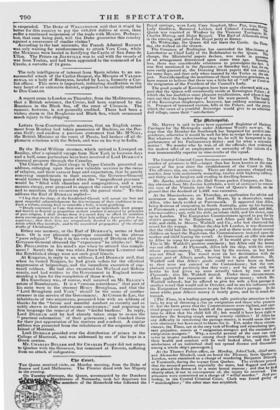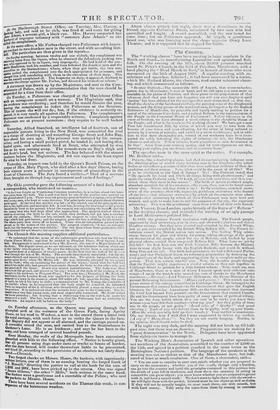The Central Criminal Court Sessions commenced on Monday. The number
of prisoners is 367,—larger than has been known at the same season of the year since the establishment of the Court in 1834. The offences, too, are serious. There are three persons charged with murder, four with maliciously wounding, twelve with highway robbery, and thirty-six for burglary and stealing in dwelling-houses.
Mr. Jacobs, solicitor to the Hull Steam-packet Company, on Mon. day obtained from Mr. Justice Littledale, a writ of certiorari to remove the case of the Victoria into the Court of Queen's Bench, on the ground that the deodand of 1,500/. was excessive. At the Mansionhouse, on Thursday, an application for advice and assistance was made to the Lord Mayor, by a shoemaker, named Allen, who lately resided at Portsmouth. It appeared that Allen, being desirous of emigrating to South Australia, gave up his business at Portsmouth ; converted his property, worth between 2001. and 3001., into moveables ; and, with his wife, an iiifant child, and his sister, came up to London. The Emigration Commissioners agreed to pay for his sister's passage in the Rajahstan ; and Allen paid 33/. for himself, wife, and child, to Messrs. Waddell and Co., who had chartered that vessel for the voyage. Before the ship left London, it was discovered that the child had the hooping.cough ; and as there were about seventy children on board the Rajahstan, the Commissioners insisted upon the mother and child leaving the vessel. At Gravesend, an offer was made to Allen to repay his passage-money, if he would give up his places. This is Mr. Waddell's positive statement ; but Allen said the money was not offered. At Plymouth, Allen left the ship, with his sister; whose passage-money, 171., was lost by the owners, as her berth was not filled up. The vessel went on her destination with the greater part of Allen's goods, leaving him in great distress. Mr. Waddell said that Allen'; goods could not have been on board, as they were not entered at the Customhouse ; but the com- plainant asserted positively that they were ; and he also said, that berths he had given up were actually taken by two men at Plymouth this Mr. Waddell denied. Under these circumstances, Alien applied for repayment of his passage- money ; which Mr. Waddell refused ; but he offered to give his wife a free passage in another vessel that would sail in October, and to use his influence with the Emigration Commissioners to pay for the sister's passage. In the mean while, poor Allen's money is nearly gone, and he is much dis- tressed. [The Times, in a leading paragraph, calls particular attention to this case, by way of throwing a slur on emigration and those who promote it but the facts prove that the Commissioners were vigilant, and e'er. cised proper care over the health of the passengers. It was a raider. tune to Allen that his child fell ill ; but would it have been right to introduce the hooping-cough among seventy children ? If Allen has any difficulty in recovering the passage.money, it would seem that his own obstinacy has been most to blame for it. Yet, under these circum. stances, the Times, apt at the easy task of feeding and stimulating igno- rant prejudice, sneers at " emigration-mongers and the customers of emigration-mongers." Why, a careful perusal of the case can only serve to inspire confidence among those intending to emigrate, that their health and comfort will be well looked after, and that the misfortune of an individual shall not spread disease and discomfort among a whole ship's passengers.] At the Thames Police-office, on Monday, John Clark, chief mate, and Alexander Mitchell, cook on board the Eleanor, from Quebec to London, were examined on a charge of murdering Benjamin Driscoll, or Yarmouth, during the voyage from Quebec. The evidence proved that the accused persons, especially the mate, had flogged and other• wise abused the decea-ed in a most brutal manner ; and that he died shortly after, if not in consequence of, the injury he received. The prisoners were committed on a charge of "wilful murder." And yes- terday, in the Central Criminal Court, Clark was found guilty of " manslaughter; " the other man was acquitted. At t thorough Street Office, on Tuesday, Mrs. Harvey, a
jolting
lady, and said to be rich, was fined .11. and costs for giving e edema, a servant-girl, a black eye. Mrs. Harvey suspected her b"o",nhati'd of improper intimacy with "common Jane Adams" as she called the complainant. At the same office, a Mr. Forbes charged two Policemen with impro- eerconduct particulars o drunken men tn the street, and with assaulting him- 'ser, The are thus given in the repot with
twelve and one o'clock, the complainant was On Souk morning,
/earning home from the .Opera, when he observed the defendants pushing two men who appeared to be in liquor, very improperly. He laid hold of the con- ilble Henderson, took his number, and then followed the drunken men and the constables to the Stationhouse; where, when they got inside, the two con- stables potted the complainant into the dock appropriated for prisoners, and breed him with interfering with them in the execution of their duty. This
; i
as the assault complained of. The Inspector on duty, it appeared, declined to entertain the charge against Mr. Forbes, and directed his immediate release." A statement was drawn up by the Magistrate, and sent to the Com- missioners of Police, with a recommendation that the men should be suspended for a time from their office. On Tuesday, a Policeman was charged at the Marylebone Office with an outrageous assault on a woman. The Magistrate said, that the evidence was conflicting; and therefore he would dismiss the case, leaving the complainant to indict the Policeman at the Sessions. This of course she will not do ; but, if the evidence is correctly re- ported, it is very nearly all against the Policeman. The complainant's statement was confirmed by a respectable witness. Complaints against Policemen are at present numerous : they require to he well looked after.
Yesterday, Alfred Stamford, an intelligent lad of fourteen, son of
respectable parents living in the New Road, was committed for trial on a charge of shooting at and wounding George Scott and John Ray, boys about his own age. The prisoner was annoyed by his compa- nions; and having a small pocket-pistol, he loaded it, and having shot, loaded again, and afterwards fired at Scott, who attempted to stop him as be was cunning away. The wounds were on Ray's thigh and and Scott's head, but not serious. The boy behaved with the utmost coolness before the Magistrate, and did not express the least regret for what he had done.
Yesterday, an inquest was held in the Queen's Bench Prison, on the corpse of Mrs. Mary Pigott, who died after a few days' illness, having been sixteen years a prisoner in consequence of proceedings in the Court of Chancery. The Jury found a verdict—" Died of a nervous fever, brought on through long imprisonment and excited feelings."



























 Previous page
Previous page